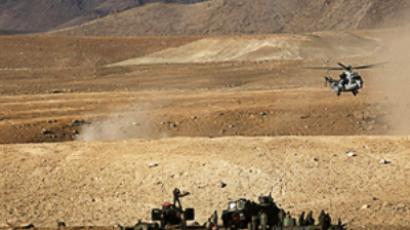ROAR: Obama will defend missile defense in Moscow

Russian analysts doubt that Washington will agree to link its missile shield in Europe to cutting strategic defensive arms.
Missile defense is expected to be one of the main subjects that U.S. President Barack Obama is going to discuss in Moscow during his forthcoming visit to Russia.
Moscow has already made it clear that it wants to link a missile shield that the U.S. is going to deploy in Europe with negotiations on strategic offensive arms.
Russian President Dmitry Medvedev has warned that the two countries may agree on any strategic arms reductions only if the U.S. eases Russia's concerns over Washington's missile defense program in Central Europe.
Many politicians and analysts in Russia believe that the deployment of a tracking radar in the Czech Republic and interceptor missiles in Poland threatens Russian security. Washington insists that the shield is to defend Europe from a possible strike of "a rogue state."
Meanwhile, Moscow and Washington are seeking a new agreement to replace the Strategic Arms Reduction Treaty (START 1), which expires in December. Moscow and Washington are holding talks on a new treaty in Geneva.
The link between strategic arms reductions and a missile defense system in Central Europe "is also acknowledged" by Washington, the Russian media have quoted Foreign Minister Sergey Lavrov as saying.
However, many Russian analysts do not expect the U.S. to scrap its missile defense plans in Europe, despite the fact that the program was launched by the previous administration of the White House. Pavel Zolotarev, deputy director of the Institute of the U.S. and Canada at the Russian Academy of Sciences, considers such a turn in Washington’s policy "unrealistic."
Any moves to review missile defense plans for Europe would be "devoured by the domestic opposition," RIA Novosti quoted him as saying.
Aleksey Makarkin, deputy general director of the Center for Political Technologies, believes it will be too difficult for Americans to abandon their position. "Under the previous administration, the U.S. did serious work, binding their allies the Czech Republic and Poland over the missile defense issue," he told Moskovsky Komsomolets daily.
"The U.S. is unlikely to let down their allies by negotiating with Russia behind their backs," Makarkin said. Americans would rather continue to persuade Russia that the missile shield is no threat to it, he believes. "The presence of Russian servicemen at the missile defense installations is possible," Makarkin said.
At the same time, he stressed that Americans need a new treaty on strategic arms reductions. "Obama has to keep his promise in due time – he entered the presidency as an outstanding politician who was ready for serious changes," Makarkin said. "And now he is a hostage to his brilliant electoral campaign. He has to prove that he is different from his successors," the expert said, adding that it makes a compromise between Moscow and Washington possible.
"However, the problem [for the U.S.] is in the details – how to take Russia's position into consideration and not let down their East European allies," Makarkin said.
In his turn, the former president of the USSR Mikhail Gorbachev, speaking during the latest Pozner TV talk show on Russia's Channel One, explained why the deployment of missile defense installations in Europe is a threat to Russia.
These plans, he believes, are aimed at creating the situation that makes it possible for NATO to be first to launch a nuclear strike while staying under the shield.
Gorbachev said Russia now does not need NATO's expansion or the deployment of the U.S. missile defense complexes in Europe. "There is a need for a common European security, which was written at a conference in Paris in 1990," he added.
The USSR was preparing its answer to the Strategic Defense Initiative (SDI), the program proposed by U.S. President Ronald Reagan in 1983, Gorbachev said. "I did not agree then and do not agree now with the opinions that [SDI and the possible deployment of the U.S. missile defense elements] is a bluff and that one should not pay attention to it," he added.
Maksim Minaev, an expert from the Center for Political Conjuncture of Russia, believes that the United States will not agree to link the deployment of missile defense elements in Europe to talks on a new agreement on strategic offensive arms reductions.
"The deployment of the regional missile defense installation is a priority for Washington," Minaev told RT Online. "More than $60 billion is to be allocated for the program within the next few years."
"The issues of strategic offensive arms and missile defense will be considered by the American side as separate ones," Minaev said. The U.S. also wants to negotiate the problems of strategic arms as part of Washington's global initiative to reduce nuclear weapons, he added.
"However, in the medium term, the plans to deploy installments of the missile defense in the Czech Republic and Poland are unlikely to be implemented," Minaev said.
The analyst does not expect any breakthroughs on the missile defense controversy during U.S. President Barack Obama's forthcoming visit to Moscow. "I think there only may be some agreements about the mutual use of radar stations in Armavir and Gabala," Minaev said.
"Nor can one rule out that the U.S. will announce its willingness to allow Russian observers to inspect the missile defense installments in Europe, which do not exist now," he added.














